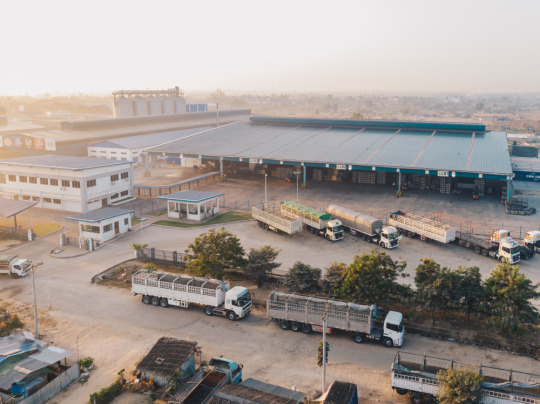#fleet solutions
Explore tagged Tumblr posts
Text

Reliable Vehicle Movement Services & Transportation Solutions in UK
Specialising in comprehensive services for Vehicle Movement for commercial fleet managers around the UK. Vardens offer seamless, cost-effective options for transporting your vehicles safely and efficiently. Discover how we can be an integral part of your fleet management strategy.
#vehicle movement services#fleet maintenance#transportation solutions#fleet solutions#vehicle cleaning
0 notes
Text
Safety First: Best Practices for Operating Heavy Equipment
Operating heavy equipment, like earthmovers, requires utmost care and attention to ensure safety at every step. As reputable farm equipment suppliers, we understand the significance of safety when dealing with these robust machines. Whether it's mining equipment or earthmovers, safety should always be the top priority. Here are essential safety tips for operating heavy equipment:
Understanding Your Equipment
Before you start operating any heavy machinery, take the time to understand it thoroughly. Each piece of equipment is unique, so read the operator's manual carefully. Familiarize yourself with the controls, safety features, and operational procedures specific to that machine.
Regular Maintenance is Key
Routine maintenance is not just about keeping the equipment in good shape; it's a safety imperative. Ensure that all heavy equipment is regularly inspected, serviced, and well-maintained. This practice reduces the risk of unexpected breakdowns that can lead to accidents.
Pre-Operational Checks
Before starting the engine, conduct a comprehensive pre-operational check. Inspect for any indications of damage, signs of wear, or components that may be loose.. Ensure that all safety systems, such as brakes, lights, and warning alarms, are in working order.
Know Your Surroundings
Operating heavy equipment such as earth-moving machines often means working in dynamic environments. Always stay aware of your surroundings, including other workers, pedestrians, and potential obstacles. Maintain clear communication with your team through hand signals or two-way radios.
Stay Alert and Avoid Distractions
Operating heavy machinery requires your full attention. Avoid distractions like using your mobile phone, listening to music at high volumes, or engaging in conversations unrelated to the task at hand. Your focus should always be on your equipment and the job.
Plan for Emergencies
Emergencies can happen despite your best efforts. Be prepared by knowing the location of fire extinguishers, first-aid kits, and emergency exits. Ensure that you and your team are trained in emergency procedures.
Safety is paramount in the heavy equipment industry. At Range Hire, as your trusted equipment suppliers and fleet solutions providers, we prioritize safety in every aspect of our business. By following these safety best practices, you can protect yourself, your colleagues, and your equipment, ensuring a secure and successful work environment.
Visit Range Hire today to explore our comprehensive range of heavy equipment, including mining equipment for hire and expert guidance.
Originally published at:
1 note
·
View note
Text

behold, captain strisc terlot, aka... the solution
#art#strisc#shes just a regular fleet captain with no special job description#however she was titled the solution because despite not even being THAT high up the ranks#shes solved every problem theyve thrown at her and is an ESSENTIAL part of the ripmaw crew#but shes very attached to her squad and thus has refused every promotion offered to her
44 notes
·
View notes
Text
What is Enterprise Fleet Management?

As is revealed in today’s world business environment, any organization must manage its resources appropriately. Thus, for companies and firms having major operations related to transportation and logistics, it becomes even more essential to manage their fleets.
Now, let’s start with the basics: what does enterprise fleet management mean? Now let’s discuss this idea and figure out how it can be of great benefit to the business processes.
Understanding what is Enterprise Fleet Management
Fleet management within an enterprise could be described as a strategic approach to managing and supervising such a company's vehicle fleet. The areas include its acquisition and maintenance, driver and vehicle management, and laws governing the automobile industry. Fleet management is prospective to optimize the operating costs and enhance the safety and productivity of both fleets and their drivers.
In an enterprise environment, fleet management goes beyond tracking the vehicles; it is more about getting improved ways of running organizations. Fleet management is important irrespective of whether it involves delivery vans, trucks, or even corporate cars if the business owns a set of cars for business use.
The outcome highlights the fundamental issues of fleet management.
Vehicle Acquisition and Disposal: Picking the correct car for your fleet, beginning from procurement to the time of disposal.
Maintenance and Repair: Managing to schedule vehicles for maintenance and repairs regularly to make sure that they are in good working condition to reduce time loss.
Fuel Management: Fuel efficiency management by controlling consumption and considering these to minimize fuel expenses by using fuel-efficient driving techniques and other energy resources.
Driver Management: Incorporating training and supervision of drivers as well as planning meals nt to support safety, compliance, and efficiency among the drivers.
Compliance and Risk Management: The safety of all the used vehicles as well as the used drivers with brutal and international requirements and managing of risk exposures of operating fleets.
Here we will discuss the concept of Fleet Management Software. Inefficiently managing all these components, many businesses turn to the use of fleet management software. This is because it acts as a platform for accessing any information regarding the fleet, including real-time data and automated operations of the fleet.
Key Features of Fleet Management Software
GPS Tracking: Precise vehicle location in real-time to increase efficiency and controllers.
Maintenance Scheduling: Schedule reminders in case of preventive maintenance and repairs to avoid ‘bottlenecks Management: Proper equipment that tracks fuel usage and gives an indication of wasteful activities.
Compliance Management: Material properties garages need to comply with set safety measures as well as regulatory requirements.
Driver Performance Monitoring: Measures to monitor and measure drivers’s performance, detect their training requirements, and incentivize them over safe behavior on roads.
Why Enterprise Fleet Management is So Important
To large companies, fleet management is not only limited to planning on how to ensure that vehicles are running. It’s about being able to harness data and technology in a way that will put you ahead of the competition. Effective management of fleets is known to have numerous benefits, such as cutting costs, satisfying customers, and reducing risks involving drivers and cars, among others.
However, due to emerging issues such as global warming, companies are now focusing on the use of fleets to be environmentally friendly. This is done through the optimization of routes, timely maintenance of vehicles, and training of the drivers to ensure they are conscious of the impact they make on the environment.
Being a web-based service, the most advantageous aspect related to an FMS or a Fleet Management Software Development Service is that it can be easily and effectively utilized across the corporate fleet range.
This has led to the increasing need for the development of fleet management software to be able to meet the expanding market need. Custom software, as the name suggests, is designed to improve organizational operations to suit a company’s needs, making it more flexible than packaged software.
A fleet management software development service typically includes
Consultation and Needs Assessment: Ah, awareness of the particular requirements and objectives of your fleet. You need to hire a professional fleet management software development company.
Custom Software Development: Constructing a custom fit that incorporates into the complex structures of the organization and fits the needs of the organization perfectly.
Integration with IoT Devices: The use of Internet of Things (IoT) devices such as GPS trackers or sensors to input real-time information and data.
Ongoing Support and Maintenance: Needed to make sure the software will continue to include all the features and incorporate the latest technologies and that it will cover all current needs of the business.
Conclusion
Okay, then, Fleet management is a system that encompasses all activities that involve control of a company’s fleet of vehicles with the use of the latest technologies in software and quality practices. Fleet management is not only a good idea but a necessity for any business that depends on transportation, where proper management of the company’s fleet is critical to achieving success.
Let it be a handful of vehicles or a multitude, the appropriate strategy in fleet management as enhanced by software changes the equation, provides steps towards optimizing your operations, lowers costs, and enhances the performance of an organization. The fast advancement of technology means that the means and ways used in the implementation of the strategies by the f managers are ever-changing and therefore a very promising industry to follow.
#business growth#fleet management#fleet maintenance#enterprise software#enterprise application development#business solutions#software#trending#viralpost#viral trends
2 notes
·
View notes
Text
https://project-lithium.com/

#fleet management companies#vehicle fleet services#fleet management providers#fleet management solutions india#fleet management service providers
2 notes
·
View notes
Text
I HATE MONEY
"if you get rid of money people will find other systems of power to abuse"
I HATE SYSTEMS OF POWER
#jo mews#i have no solutions im just mad and want humans to be nice to each other and dont get why thats so fucking difficult#why cant we all have what we need to live happy comfortable lives#lives where we can pursue our goals and dreams and fleeting whims
4 notes
·
View notes
Link
The demand for fleet management system varies according to various countries in the regions. North America is currently the largest region in the fleet management market.
The global fleet management market is projected to reach $41.54 billion by 2031 from $8.35 billion in 2022, growing at a CAGR of 19.52% during the forecast period 2022-2031.
Get the report sample: https://bisresearch.com/requestsample?id=1444&type=download
#fleet management#fleet services#fleet management system#fleetmanager#fleet management services#fleet ship management#fleet management solutions#smart fleet#vehicle management#Fleet Management Market#Fleet Management report#Fleet Management Industry
6 notes
·
View notes
Text
TransportSimple is a fleet management company providing fleet services and solutions while reducing the total expences on oprations and miximize the profit. TransportSimple provides best fleet management solutions for fleets of all sizes.
#fleet management software#fleet management solution#fleet tracking software#fleet tracking system#vehicle tracking software#trucks fleet management#fleet management software companies#truck fleet management#fleet management software dubai#fleet management software qatar#software fleet management#fleet management dubai#fleet management uae#fleet management solution dubai#fleet management solution qatar#fleet management system dubai#tracking management solution#tracking management system#tracking management software
2 notes
·
View notes
Text

Fleet Cleaning Specialists Since 1993 - Vardens
Learn about Vardens’ journey to becoming the UK’s leading commercial fleet cleaning specialists. Regular washing removes dirt, grime, and salt, preventing paint damage and rust. Clean trucks impress clients and maintain functionality.
#truck washing#fleet maintenance#car care#vehicle cleaning#mobile car wash#Cleaning Experts#Fleet Solutions
0 notes
Text
Expert Fleet Solutions for Specialized Equipment Needs - Range Hire

Range Hire is a leading provider of earthmoving equipment for rent. Their team of experienced operators ensures that clients receive the best results. For a complete range of earthmoving equipment and to book a rental, visit here - https://www.rangehire.com.au/specialist-project-equipment-hire-fleet-solutions/
0 notes
Text
**"The Vital Overview to Vehicle Repair: Maintaining Your Automobile in Top Forming"**
When it concerns preserving your car, recognizing the fundamentals of vehicle fixing can save you both money and time. Routine upkeep, such as oil adjustments, tire rotations, and brake inspections, is vital to ensure your vehicle runs efficiently and efficiently. By acquainting on your own with usual car fixing terms and practices, you can much better connect with mechanics and make informed decisions concerning your vehicle's wellness. Furthermore, recognizing when to seek expert help can protect against small problems from escalating right into expensive fixings, aiding you remain risk-free on the road.In today's busy world, several motorists count on their lorries for everyday commutes, family trips, and weekend experiences. Therefore, auto repair service is not just concerning fixing problems; it has to do with improving the durability and efficiency of your automobile. From understanding cautioning lights on your control panel to recognizing unusual audios, being proactive concerning your vehicle's maintenance can cause an extra pleasurable driving experience. Whether you're a skilled car fanatic or a new car owner, having the best understanding about auto repair work can empower you to take control of your vehicle's upkeep and ensure it stays a reliable buddy for many years ahead.
Read more here https://f004.backblazeb2.com/file/uwupek/Fleet-technology/Inspection-Management/Fleet-inspection-and-audit-management.html
0 notes
Text
Commercial Vehicle Upfitting - Customize Your Next Work Vehicle
Whether you need to transport a vehicle, deliver goods, haul materials to a construction site, or rent out your work vehicle, you can create the perfect commercial vehicle for your needs at Bayshore Ford Truck Center.
https://www.bayshoreford.com/blog/2024/december/24/commercial-vehicle-upfitting-customize-your-next-work-vehicle.htm

#Commercial Vehicle Upfitting#Work Vehicle Customization#Fleet Vehicle Solutions#Vehicle Upfitting Services#Custom Work Trucks#Upfitted Trucks for Business#Fleet Customization Options#Work Vehicle Modifications#Industry-Specific Vehicle Solutions
0 notes
Text
Boost Fleet Efficiency with Advanced Vehicle Tracking and Load Management
Enhance your operations with the best Fleet Management Solution from iTruck Dispatch. Their advanced dispatch track app and Load Management software ensure seamless coordination and increased efficiency. With real-time Vehicle Tracking, you can monitor fleet performance, optimize routes, and reduce operational costs. Whether you're managing a small fleet or a large trucking operation, their solutions are tailored to boost productivity and streamline logistics. Explore their blog to learn how these innovative tools can transform your fleet management and keep your business ahead of the competition.
#fleet management solution#load management#vehicle tracking#dispatch software#trucking services#tracking app#load tracking app#carrier tracking#truck business#dispatch solutions
0 notes
Text

#Fun #Family #Time #Royal Family
#@fazza#youtube#business setup in uae#gps fleet tracking software uae#uae#erp solutions uae#free use slvt#princehamdanfazza#uap#erp software uae#RoyalFamily
2 notes
·
View notes
Text
** The Crucial Guide to Automobile Fixing: Keeping Your Car Running Smoothly **
When it concerns keeping your lorry's efficiency, understanding the essentials of car repair is essential for every vehicle owner. Routine upkeep can prevent minor concerns from intensifying right into expensive repairs, guaranteeing your cars and truck stays secure and trusted when driving. From regular oil adjustments and tire turnings to much more intricate jobs like brake substitutes and engine diagnostics, knowing what your automobile needs and when can conserve you time and money. Furthermore, familiarizing on your own with common indications of trouble-- such as unusual sounds, advising lights, and liquid leaks-- will empower you to address problems early, potentially extending the life-span of your vehicle.In the ever-evolving globe of vehicle innovation, remaining informed regarding the most recent improvements in car repair service is important. Modern cars often come geared up with innovative systems that call for specialized understanding and devices to identify and repair. This is where locating a credible automobile service center ends up being crucial. Try to find licensed specialists who are experienced with your car's make and model, along with those who use the most up to date analysis devices. By establishing an excellent connection with a trusted auto mechanic, you can make sure that your car receives the very best care possible, allowing you to drive with self-confidence knowing your vehicle is in leading shape.
Read more here https://sites.google.com/view/automatedfleet/home
0 notes
Text
**"The Essential Guide to Car Fixing: Keeping Your Car in Top Forming"**
When it comes to maintaining your vehicle, comprehending the fundamentals of car repair work can conserve you both time and cash. Regular maintenance, such as oil adjustments, tire turnings, and brake evaluations, is important to guarantee your cars and truck runs smoothly and effectively. By familiarizing yourself with typical automobile repair work terms and methods, you can better interact with auto mechanics and make informed decisions regarding your automobile's wellness. Additionally, understanding when to look for specialist help can protect against little issues from rising into expensive repair services, helping you stay risk-free on the road.In today's busy world, numerous chauffeurs count on their lorries for day-to-day commutes, family members outings, and weekend break adventures. Consequently, vehicle repair is not simply concerning repairing problems; it's about improving the durability and efficiency of your auto. From understanding advising lights on your control panel to recognizing uncommon noises, being positive concerning your car's upkeep can result in a much more satisfying driving experience. Whether you're an experienced car enthusiast or a first-time automobile owner, having the right knowledge about car repair work can empower you to take control of your automobile's upkeep and ensure it remains a reputable friend for many years to find.
Read more here https://852.s3-web.ap.cloud-object-storage.appdomain.cloud/vehicle-maintenance/Communication-Platforms/Fleet-maintenance-customer-support.html
0 notes